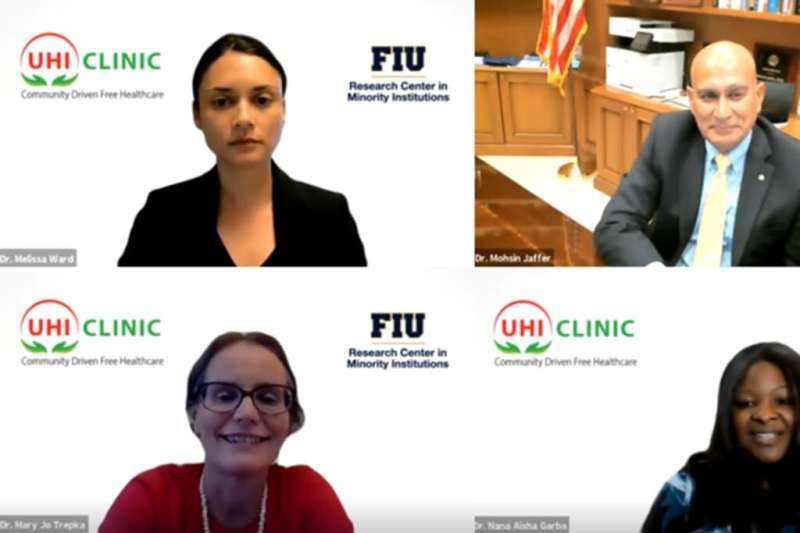Town halls help build COVID-19 vaccine confidence among minority communities, study finds

Building trust with minority communities through virtual town halls and community partnerships can help reduce vaccine hesitancy, suggests a recent study published by FIU researchers.
Vaccine hesitancy poses a challenge for global vaccine initiatives. Social media can be a breeding ground for misinformation, and public health experts have needed to get creative to break through the noise to disseminate facts.
In the study published in the Journal of the American Pharmacists Association, researchers from the Research Center in a Minority Institution at FIU (FIU-RCMI) shared preliminary findings from a year-long investigation on how virtual town halls can help build COVID-19 vaccine confidence among medically underserved and vulnerable communities in South Florida.
Together with six community partners, the researchers hosted a series of town halls that invited South Floridians from predominantly Black, Hispanic and Haitian-Creole communities to hear directly from public health and medical experts about the safety and effectiveness of the COVID-19 vaccine and to ask questions.
In total, 442 participants attended and were invited to complete live polls at the beginning and end of town halls. Among those who completed both polls, 69 were unvaccinated at the time they attended the town hall. The percent of unvaccinated poll participants indicating they were likely to get vaccinated rose from 58% to 72.5%—a significant increase that provides a glimpse at the impact town halls can have on helping to sway vaccine-hesitant people.
"The town halls helped the people who were hesitant and just needed opportunities for more information from people they trusted," says Michelle Hospital, a leader at FIU-RCMI and associate professor of biostatistics at the Robert Stempel College of Public Health & Social Work. "Our community partners played a big role in helping us connect with these individuals."
Best practices for producing virtual COVID-19 town halls
Town halls are known to be a great way to connect and answer questions from diverse audiences. With the COVID-19 pandemic, public health and medical experts have leveraged the tool to combat misinformation and boost vaccine confidence. So, what are the best practices for a successful town hall? The study revealed a few insights.
- First things first, know your target audiences
The researchers knew they needed to reach out to medically underserved and vulnerable communities as they are at higher risk of acquiring COVID-19 and face poorer outcomes like morbidity, hospitalization and death. So the researchers zeroed in on South Florida due to FIU-RCMI's network of community partners, as well as the region's existing health disparities and dramatic rise in COVID-19 cases at the time.
Identifying target audiences helped FIU-RCMI's researchers tailor the town halls' content to meet the audience's needs. - Partner with trusted community leaders
Community leaders can help reach a diverse population, advise on content, support marketing promotions and be a trusted voice for each target audience. For example, for the FIU-RCMI town halls, researchers teamed up with leaders of programs, institutions and health organizations to review town hall materials, help promote the event and recruit town hall participants.
"The development of the town hall from start to finish was a very community-engaged process," said Hospital says. "Our Community Advisory Board is made up of representatives from diverse community organizations and they gave us feedback every step of the way." - Build a diverse speaker panel of trusted sources
Community leaders and medical professionals can help open dialog, build trust and rapport, and inform target audiences how to best protect themselves during the pandemic.
"It was important to us to have a co-host for each of our town halls who was a known person within the community that we were speaking with," Hospital says. "It helped us build trust with the people we were trying to reach."
Having medical professionals participate in the panel is just as important—7 out of 10 vaccine-hesitant town hall participants reported trusting doctors and health care providers. - Disseminate information in different formats and languages
Communication between the community and clinical providers is key. In the United States, nearly 25 million people speak little to no English. In the context of COVID-19, accurate and timely information in the community's native language is paramount.
"The feedback we were receiving from our community advisory board was that their constituents were seeking accurate information about COVID-19 from reliable sources in their native languages, which was not easily available," Hospital adds. "One of the action items from our discussions was to host a Spanish-language town hall to open access to Hispanic participants who did not speak English."
Through the support of community partners, FIU-RCMI researchers also developed FAQs in English, Spanish and Haitian-Creole that were used to disseminate scientific information to minority communities. First, partners helped the researchers review materials and advised on linguistic and cultural appropriateness and community accessibility, relevance and appeal. Then, when new information came out about the virus and the vaccine, the researchers and partners got to work to ensure materials were updated with the latest news.
More information: Eric F. Wagner et al, Virtual town halls addressing vaccine hesitancy among racial and ethnic minorities: Preliminary findings, Journal of the American Pharmacists Association (2021). DOI: 10.1016/j.japh.2021.11.005





















